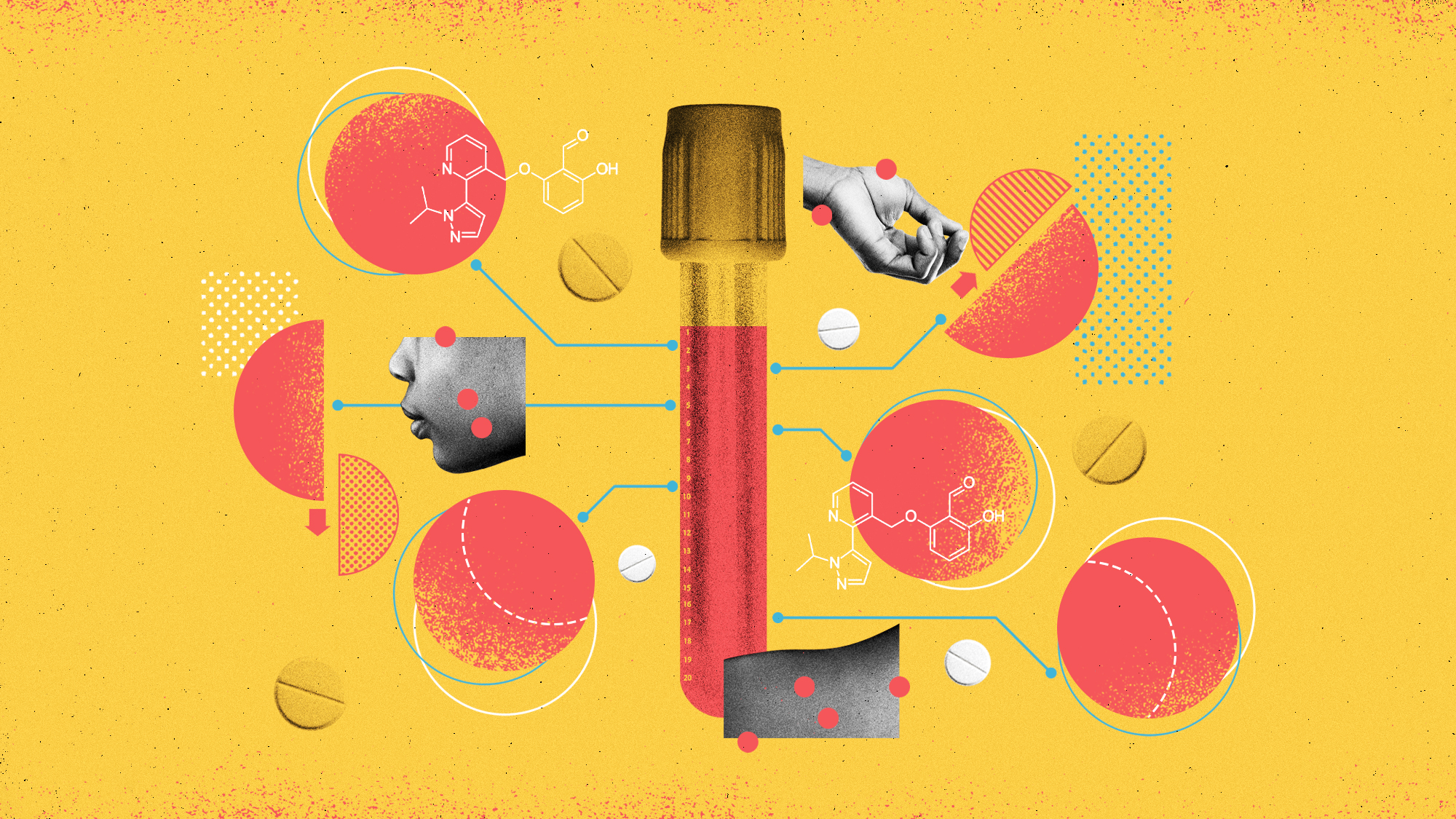What is sickle cell anaemia?
The UK has approved the use of a new drug to treat a disease that predominantly affects people of colour

A free daily email with the biggest news stories of the day – and the best features from TheWeek.com
You are now subscribed
Your newsletter sign-up was successful
Five seemingly unconnected Black and ethnic minority Londoners discover they have superpowers in the hit Netflix series "Supacell". The link between them? They all suffer from sickle cell anaemia, a condition that disproportionately affects people of colour.
Beyond "subtly interspersing real-life issues that affect Black Britons" into the plot, the inclusion of sickle cell anaemia is its "biggest real-life undercurrent", wrote Lanre Bakare in The Guardian. The show began airing in June, a month after the UK's National Institute for Health and Care Excellence (Nice) approved a new drug that may alleviate the symptoms of the illness for the thousands of people who suffer from it.
What is sickle cell anaemia?
Sickle cell anaemia is a genetic condition in which the shape of blood cells changes into crescents reminiscent of a sickle, a mutation which can cause episodes of severe pain and other symptoms, and shorten life expectancy.
The Week
Escape your echo chamber. Get the facts behind the news, plus analysis from multiple perspectives.

Sign up for The Week's Free Newsletters
From our morning news briefing to a weekly Good News Newsletter, get the best of The Week delivered directly to your inbox.
From our morning news briefing to a weekly Good News Newsletter, get the best of The Week delivered directly to your inbox.
In the UK, approximately 17,500 people live with sickle cell disease. Only one in five people know about the disease, according to Rapman, the creator of "Supacell", who is also known as Andrew Onwubolu. "It's crazy how unknown it is, especially for a disease that affects so many people," he told The Guardian.
How is it different from sickle cell disease?
Sickle cell disease refers to a set of related genetic conditions that affect red blood cells. Sickle cell anaemia is the most common and the most serious, and occurs in people who have inherited the gene from both parents, according to the NHS. Sickle cell disease predominantly affects people with an African or Caribbean heritage, as well as a smaller number of people with South Asian, Latin American or Middle Eastern ancestry.
What are the symptoms?
The main symptom of sickle cell disease, said the NHS, is painful episodes called "sickle cell crises" that can be "very severe" and last for days or weeks. These can be triggered by exposure to cold, sudden temperature changes or dehydration.
Those living with sickle cell disease are prone to anaemia episodes because in the misshapen red blood cells cannot carry enough oxygen around the body, leading to shortness of breath and tiredness. The deformed blood cells can also cause blockages in blood vessels, putting patients at risk of strokes and coma. Sickle cell disease is also associated with a higher susceptibility to certain types of infection. Sickle cell anaemia is a life-limiting condition that can shorten life expectancy by 20 to 30 years at its most severe, although average life expectancy with the disease has increased in recent years.
A free daily email with the biggest news stories of the day – and the best features from TheWeek.com
Why does it mostly affect Black and ethnic minority people?
This genetic variant is common among people from specific ethnic groups because the sickle shape of the red blood cell is "inhospitable to the parasite that causes malaria", said red blood cell researcher Johan Flygare on The Conversation. Technically, therefore, sickle cell disease protects individuals from malaria. But the sickle-shaped cells break down very easily as a result, and this leads to many of the symptoms.
What is the treatment?
Sickle cell anaemia sufferers need frequent blood transfusions. These offer quick relief to improve oxygen levels and reduce stroke risk, but they also cause iron to build up in vital organs like the heart and liver. There is also the potential for life-threatening immune reactions, such as "transfusion-related acute lung injuries", said Flygare.
Treatment options also include hydroxyurea, a relatively cheap drug that induces the production of a foetal version of the haemoglobin gene. This, in turn, leads to the formation of red blood cells and alleviates symptoms – but it also reduces the white blood cell count, which can weaken the immune system.
A new drug called Voxelotor which alleviates the symptoms of sickle cell disease has been described as "life-changing". It works by helping haemoglobin hold on to more oxygen and prevent them from becoming misshapen, said Sky News. Although it was initially rejected for widespread NHS use, Nice approved the drug in May for treating sickle cell anaemia in people aged 12 and older, with around 4,000 patients set to benefit.
Keumars Afifi-Sabet is a freelance writer at The Week Digital, and is the technology editor on Live Science, another Future Publishing brand. He was previously features editor with ITPro, where he commissioned and published in-depth articles around a variety of areas including AI, cloud computing and cybersecurity. As a writer, he specialises in technology and current affairs. In addition to The Week Digital, he contributes to Computeractive and TechRadar, among other publications.
-
 James Van Der Beek obituary: fresh-faced Dawson’s Creek star
James Van Der Beek obituary: fresh-faced Dawson’s Creek starIn The Spotlight Van Der Beek fronted one of the most successful teen dramas of the 90s – but his Dawson fame proved a double-edged sword
-
 Is Andrew’s arrest the end for the monarchy?
Is Andrew’s arrest the end for the monarchy?Today's Big Question The King has distanced the Royal Family from his disgraced brother but a ‘fit of revolutionary disgust’ could still wipe them out
-
 Quiz of The Week: 14 – 20 February
Quiz of The Week: 14 – 20 FebruaryQuiz Have you been paying attention to The Week’s news?
-
 ‘Zero trimester’ influencers believe a healthy pregnancy is a choice
‘Zero trimester’ influencers believe a healthy pregnancy is a choiceThe Explainer Is prepping during the preconception period the answer for hopeful couples?
-
 Scientists are worried about amoebas
Scientists are worried about amoebasUnder the radar Small and very mighty
-
 Metal-based compounds may be the future of antibiotics
Metal-based compounds may be the future of antibioticsUnder the radar Robots can help develop them
-
 Stopping GLP-1s raises complicated questions for pregnancy
Stopping GLP-1s raises complicated questions for pregnancyThe Explainer Stopping the medication could be risky during pregnancy, but there is more to the story to be uncovered
-
 RFK Jr. sets his sights on linking antidepressants to mass violence
RFK Jr. sets his sights on linking antidepressants to mass violenceThe Explainer The health secretary’s crusade to Make America Healthy Again has vital mental health medications on the agenda
-
 Nitazene is quietly increasing opioid deaths
Nitazene is quietly increasing opioid deathsThe explainer The drug is usually consumed accidentally
-
 The plant-based portfolio diet invests in your heart’s health
The plant-based portfolio diet invests in your heart’s healthThe Explainer Its guidelines are flexible and vegan-friendly
-
 More women are using more testosterone despite limited research
More women are using more testosterone despite limited researchThe explainer There is no FDA-approved testosterone product for women